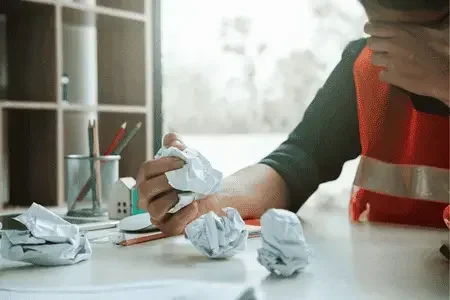
Let Your Students See You Fail
by Rebecca
This morning, during a zoom lesson with a 4ieme (8th grade) student, I forgot what caused Fragile X Syndrome.
The lesson was on chromosome aberrations, and I am out of practice. He’s falling behind in his science lessons, and we are using his school holiday to help him catch up and review. It’s been a hot minute since I had anything to do with mitosis and chromosomes.
When I forgot, I pulled out his diagram and we looked at it together. Neither of us could see it on the picture. So, with the screen still shared, I let him watch me google it.
When I began my career, this would have broken me. I would have considered it a failure of knowledge, of organization, of professionalism. I would have kicked myself up and down the hallway, I would have done everything I could have to hide from the student that I had forgotten (or never knew), and I would have spent hours stressing and preparing for my next lesson with him.
I teach upper elementary when I’m in my classroom, and that means I teach all the subjects. People often ask me, “How do you know all that information?” And the truth is: I don’t.
I didn’t know about Newton’s three laws of motion before I taught them for the first time 6 years ago. I hadn’t read The Breadwinner, or learned the history of Afghanistan, before I taught it for the first time 3 years ago. I learned what we have to do to be able to live on Mars as my students did last year, when I taught about it for the first time. I don’t know it all, and to pretend I do, all the time, is disingenuous and harmful to students.
The student I taught this morning is falling behind in his science class, and it’s bugging him. He’s worried it’s because he’s stupid, or a bad student. He thinks he might be the only one who can’t keep Fragile X and Turner’s syndrome straight, or who forgets the difference between mitosis and meiosis. He hates that he needs to get help.
What if, afraid of how I would look, I had hidden that from him? If it was so important to me to continue to look like the expert in the room that I pretended I knew what caused Fragile X, and came to him with a perfectly planned explanation, I might have reinforced the idea that he is alone in his forgetfulness, and I would have modeled for him that knowledge is static and memorised, and that you either have it or you don’t. That would have been a real failure.
Instead, I let him see that knowledge is constantly updated, learned, and checked. I showed him that being an expert doesn’t mean never having to check or learn. When I showed him that I also had to google it, it showed him that it’s normal to forget, that good students and smart people have to look things up. It also modeled a strategy for him that he can use himself when he gets stuck, which he might not have learned if I had made it look like magic.
In recent years, I have allowed every single one of my students to see me fail, make mistakes, and forget things. Every time, I am explicit in my explanations, narrating my mistake and my solution. I explain to them that I am googling information and that they can do the exact same thing.
I know some teachers are cringing as they read this! It can be humbling to allow yourself to fumble in front of a room full of people, especially if those are people who you hope will look up to you and respect you. And there can be some professional consequences to this approach. I have worked with teachers who think I’m not as dedicated when they see me googling during class. I worked, once, with a parent who told me that his son was failing his history tests because he saw some typos in the notes I typed up in class as we discussed the issue together instead of having the worksheets ready to go before class.
It’s worth it.
It’s worth it for the students who don’t feel unintelligent or isolated.
It’s worth it for the kids who go to grab an iPad and look up the answer by the themselves the next time they get stuck.
It’s worth it for the kids who don’t give up when it’s hard, because they see that you don’t give up.
It’s worth it for the kids who learn that failing once doesn’t mean failing forever.
It is worth every humbling moment, because once you build that classroom culture, of failing and trying again and checking facts and looking things up, it stops being humbling and starts being empowering. I have never had a class who actually stopped respecting me because I showed them that saying “I don’t know” isn’t such a bad thing.
A little while ago, I overheard a group of students talking about a problem they had really messed up. “Don’t worry,” said one of them who didn’t know I could hear. “We can fix this. We’ll just do a Ms. Gulka.”
Let them see you fail. Let them see you fix it. And everybody, including the teacher, can take a deep breath, and cut themselves some slack.